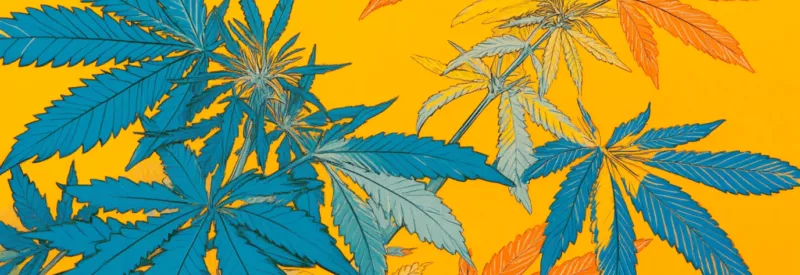In addition to its lush, rolling hills and postcard-perfect landscapes, Vermont is also known for its resident’s love of all things green— including every form of the cannabis plant.
Having established itself as a trailblazer in the world of recreational marijuana, Vermont is a state where a broad spectrum of cannabidiol (CBD) potencies is not only legal but profitable. In fact, Vermont’s laid-back cannabidiol laws allow for hemp-derived CBD products to exceed the standard federal limit of 0.3% THC. This rule makes it much easier for merchants to sell a wider variety of supplements, topicals, and even food and beverage products. If you want to acquire your CBD license in Vermont, here’s how you can get a business up and running.
How to Start a CBD Business in Vermont
You may be wondering if you need a license to sell CBD-infused products in Vermont. According to the state of Vermont’s Cannabis Control Board, any CBD or hemp-related product that fails to surpass the threshold of 1.5 mg of THC per serving can technically be sold online or through assorted retail outlets in the state of Vermont. [1]Vermont Cannabis Control Board. “Hemp Program”. Accessed on June 11, 2024.
To successfully start a CBD business in Vermont, you’ll follow many of the same steps that you would if you were located in any other state. Vermont has its own specific regulations related to the business of hemp and cannabidiol, which we’ll explore in the following paragraphs.

Business-related Steps
On the business side of things, you’ll need to:
- Write up a basic business plan to map your road to success. A business plan is where you will be able to outline your business elements in concrete detail, from startup capital to projected revenue.
- Register your business. Choose an appropriate structure (sole proprietorship, partnership, LLC, etc.) to register your business. For tax purposes, you must also secure an Employer Identification Number (EIN) from the Internal Revenue Service (IRS) [2]Internal Revenue Service “Apply Online for A Federal Tax ID/EIN”. Accessed on June 11, 2024.. Merchants can complete this application online.
- Market your business. This step is straightforward enough: understand who your customer base is and market to them directly. Of course, you will still need to adhere to federal guidelines on CBD marketing. Refrain from using misleading language, making inaccurate or curative claims, or promoting overconsumption of cannabidiol.
- Partner with a payment processor. Consider partnering with a merchant services provider that has a background working with CBD-related businesses.
- Define your shipping and pricing models. Partner with reliable logistic carriers and shipping vendors and make sure to set realistic and attainable delivery timelines.

CBD-specific Steps
- Acquire all necessary permits. It is critical that all aspiring CBD merchants register their business with the USDA as of 2023. The 2018 U.S. Farm Bill is a great place to start, at least on the federal level. We recommend that merchants familiarize themselves with current Vermont statutes governing hemp harvesting and processing and its related derivatives. After all, careful preparation is important when dealing with an industry that many have categorized as high-risk.
- Find a CBD vendor or process your own. When starting a CBD business, many merchants find that they can grow and process CBD products in-house. Another option is partnering with a licensed wholesale vendor. The most important part of this step is ensuring that your products meet all federal and state regulations.
- Meet all labeling and packaging guidelines. As a CBD merchant, you are legally required to utilize reusable materials when packaging consumable cannabidiol products. Labeling requirements necessitate accurate information displayed on the container, such as cannabis strain, THC content, manufacturer details, batch number, and product-related warnings.
- Stay informed and adapt. The CBD industry is an ever-evolving one where amendments and legal modifications are the norm. Still, the fact remains that many see CBD as a high-risk industry. To ensure that you remain compliant, be sure to stay up-to-date with all the latest regulations, news stories, and market trends in the world of CBD.
How to Get a CBD License in Vermont
From CBD oils to tasty gummies, Vermont is a state that loves and appreciates cannabidiol. Despite being a CBD-friendly part of the country, there are still conditions that business merchants in the hemp sector must abide by. In terms of basic steps towards acquiring one’s CBD license, merchants should be ready to provide, among other details, their full legal name, address, date of birth, fingerprints, and a copy of their state ID or CDL (Commercial Driver’s License) [3]Vermont State Cannabis Control Board. “Licensing of Cannabis Establishments”. Accessed on June 11, 2024..
As of August 2023, the CCB, or Cannabis Control Board, has introduced new regulations for administering the state’s hemp licensing program. In turn, merchants must decide precisely what type of Vermont-based CBD license their business requires. Ask yourself the following questions: will you be growing, processing, or selling cannabidiol? What levels of potency will your products contain? How reliable is the merchant account you are using?
The CCB has established the following tiers as they relate to CBD cultivation, retail, and manufacturing licenses:
(a) Tier 3 Manufacturer: May purchase, process, manufacture, transfer, and sell cannabis and cannabis products to other licensees using lawful extraction methods. May not sell directly to consumers.
(b) Tier 2 Manufacturer: May sell to other licensees rather than directly to consumers. May not manufacture products that utilize specific forms of extraction. Merchants may use water-based extraction, food-based extraction, or heat/pressure-based extraction.
(c) Tier 1 Manufacturer: May sell cannabis to other licensees but not directly to consumers using the same methods as a tier 2 manufacturer. It must be a home occupancy business with no more than one employee and under $50,000 in gross revenue each year.
Spectrum tinctures, capsules, and salves with up to 1.5 mg THC per serving and a ratio of THC to CBD of 1:20 or greater will be considered non-intoxicating. Therefore, these milder products will not be subject to the typical adult-use and medical cannabis rules, regulations, and limits.
CBD License Application Requirements for Vermont

All merchants who wish to sell CBD in Vermont, particularly products that surpass the 1.5 mg limit of THC per serving, must apply for a license in order to do so. In applying to the Cannabis Control Board, these merchants are therefore responsible for any fees, transactions, and additional mandates dictated by said board.
There is plenty of information out there regarding license tiers and state-based regulations. Make sure to do all the necessary research before formally submitting your application. It may also help to familiarize yourself with CBD’s legality in states outside of Vermont to better understand the ins and outs of Vermont-specific cannabidiol laws.
Below, we’ll outline a few of the categories that comprise the CBD trade in Vermont:

Hemp Cultivators
Hemp can be legally grown, produced, processed, or traded in the state of Vermont. As of 2023, individuals and entities wishing to grow hemp must apply to the USDA (not the Vermont Agency of Agriculture, Food and Markets’ Hemp Program, as was the case previously). The VAFM is no longer accepting registrations to grow or process hemp in the state of Vermont.

CBD Producers
In order to call yourself a CBD producer, you must register through a unique portal. This involves a slightly different process than what we’ve described thus far.
Product manufacturers who wish to distribute hemp products such as food, feed, or beverages will need to look into the assorted categories their product falls under. For instance, to manufacture products with THC content at or above the levels we’ve cited, you must first register as an official cannabis product manufacturer through the CCB’s adult-use licensing platform [4]Vermont Official State Website. “Cannabis Control Board Licensing System”. Accessed on June 11, 2024.. This platform is where you will register each of your individual CBD products.
There is no annual registration fee for non-intoxicating CBD products. According to the CCB site, a staff representative should contact you to coordinate payment at a later date (if necessary).
To move forward, you must be licensed and authorized under a state hemp program, tribal hemp program, or the USDA. The exact program type will depend in part on your facility’s size and location. To apply, simply adhere to the following steps:
- First, create an account in the Hemp eManagement Platform (HeMP) [5]USDA.gov. “Hemp eManagement Platform”. Accessed on June 11, 2024.. from the U.S. Department of Agriculture.
- Read their user guide for producers [6]USDA.gov. “AMS Domestic Hemp Production Program.” Accessed on June 11, 2024..
- Register through the federal portal.
- Complete a criminal history report through the Federal Bureau of Investigations [7]FBI. “Identity History Summary Checks (Rap Sheets)”. Accessed on June 11, 2024.. This must be done no more than 60 days before applying.
- Follow all federal labeling guidelines.

CBD Merchants
The sale of non-intoxicating cannabidiol products in Vermont is both legal and also subject to sales tax [8]Vermont.gov. “Hemp and Cannabidiol (CBD) Products, Vermont Sales and Use Tax.” Accessed on June 11, 2024.. The exception to this rule is agricultural hemp plants and their derivatives. This is also true of food and beverages, which fall under a different tax code.
Non-intoxicating products with less than .3% THC will require a seller to be licensed by the state’s hemp program. All intoxicating products are sold through the adult-use and medical markets. An “intoxicating” or psychoactive product is defined as:
- Consumable hemp products with 1.5 mg or greater total THC per serving or
- Consumable hemp products that contain more than 10mg of total THC per package.
Laws and Regulations for Selling CBD in Vermont
When applying for a CBD license, it is important to remember that full-spectrum tinctures, capsules, and salves with up to 1.5 mg of THC per serving (and a ratio of THC to CBD of 1:20 or greater) are considered non-intoxicating. Therefore, these items do not apply to adult-use cannabis stipulations.
Title 6 (Chapter 34) of Vermont Statutes permits state residents the right to buy or sell CBD products with a license, regardless of their source. Vermont follows the following laws and regulations:
- Senate Bill 157 allows Vermont residents to buy or sell hemp-derived CBD products with less than 0.3% THC content.
- Under Senate Bill 76, Vermont residents with qualifying medical conditions can purchase marijuana-derived CBD products.
- Senate Bill 54 allows Vermont residents over the age of 21 to purchase marijuana-based CBD for recreational purposes.
- Vermont’s Cannabis Control Board oversees the sale and production of medical and recreational marijuana-derived CBD products.
- Merchants can sell a maximum of one ounce of recreational marijuana to adults aged 21 and above.
- Synthetic cannabinoid products like Delta-8 and Delta-10 are prohibited at this time. The CCB cites insufficient safety data as the reason for this decision.
Additionally, a 6% excise tax will be imposed on the retail sale of CBD within Vermont’s borders. Cannabidiol that is incorporated into a taxable meal is also subject to a tax.
How to Renew Your CBD License in Vermont
With all the work you’ve put into getting your CBD license, it is worth noting that this license will expire after one year. While that may sound like a good amount of time, it’s really not. Preparation and foresight will be vital in terms of keeping your business afloat. After following the business-and-CBD-specific steps we’ve outlined and submitting all applicable fees, you will eventually receive your license in the mail. If you happen to be in the process of renewing your license, this video can help guide you through the steps.
Start Selling CBD in Vermont
Businesses or individuals interested in selling cannabidiol can obtain a CBD license from the Vermont CCB. You can most likely expect the board to approve your application if you meet the licensing requirements. This includes paying all scheduled fees without any additional disruptions.
Given the popularity of eCommerce as a platform, CBD merchants may want to consider setting up an online store. Since cannabidiol is still considered high-risk, we recommend that all interested parties partner with a trusted high-risk merchant services provider with ample experience in the CBD field. By doing this, you will be providing your customers with safe, dependable, and consistent payment options that will all but guarantee your success in the CBD sector.
All Businesses Deserve A Chance
We can approve almost any business type.
Approval Rating
Vermont CBD Licenses: FAQs
Below, we’ll answer some questions regarding Vermont-specific CBD licensing:
Is CBD legal in Vermont?
Yes, CBD is legal in Vermont. This is true whether the CBD in question has been derived from hemp or marijuana (the former defined as that which contains less than 0.3% THC on a dry weight basis). Who can buy and sell CBD-based goods is primarily dependent on the product’s potency.
How much does a CBD license cost in Vermont?
The answer to this question varies depending on the license tier. A retailer cannabis license costs $10,000, while a wholesale license costs $4,000, and a cultivation license can cost up to $75,000.
Can you sell CBD without a license in Vermont?
No, you cannot sell CBD in Vermont without a license. To do this in accordance with state law, one must obtain the proper certification from the Vermont Cannabis Control Board, the USDA, or the state’s hemp program.
How long is a CBD license valid in Vermont?
Merchants can sell or manufacture CBD in Vermont for up to 12 months from the date of the issuing permit.




